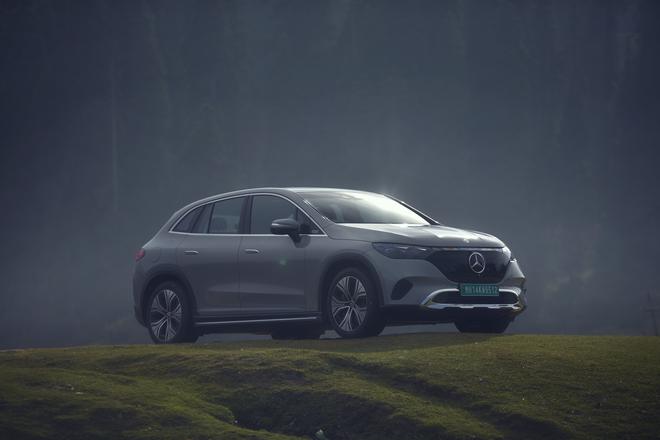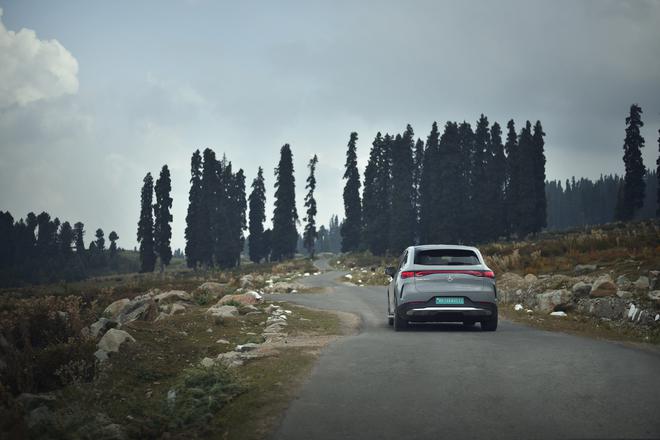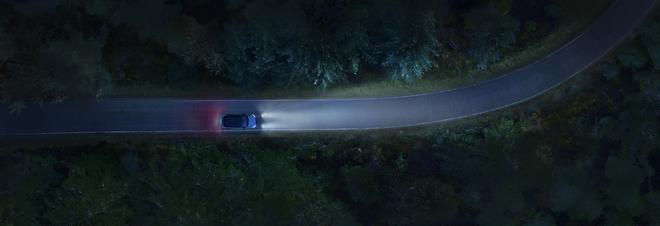Mercedes’ EV Magic
This week, Mercedes-Benz India releases its third electric vehicle for the Indian market—the EQE 500 SUV—after the EQB SUV and EQS super luxe sedan, and this one is priced at a whopping INR 1.39 crore.
This SUV is quite a looker and has the aerodynamic design cues of the previous Mercedes EVs, with the black panel for a front grille and stylised, pointy nose. The door handles that flush into the body give it an even sleeker look. It has a muscular, yet refined look as it stands on 20-inch light alloy wheels.
This impressive 550km range, , is powered by a 90.56 kWh battery. The accelerator and the EQE demonstrate a very impressive torquey jump thanks to a maximum torque of 858 Nm, promising a 0 to 100 kmph sprint in a snappy 4.9 seconds, an impressive time stamp given the proportions of this SUV.

In terms of drive experience, we tested out this one on narrow mountain roads, and it handled the curves impeccably. Suspension also gets a thumbs up from us as we noticed when took the car off the tarmac onto mildly rocky terrain. While we give kudos to the Germans for packing in their cars with safety features, we would prefer some tweaks contextual to the Indian market - the anti-collision warning, for instance, needs to be manually turned off every time, else the car brakes with every passing animal, pedestrian or vehicle, which are expected on Indian roads.
What stands out are the interiors. The luxe element comes out with the massive 56-inch Hyperscreen, sweeping through the entire front dashboard . In addition to the digital driver display and the OLED central touchscreen, the passenger also gets an individual screen for climate control and infotainment..

From a utilitarian point of view, the cabin comes with lots of handy stowage . The magnolia wood storage compartment gives a design-heavy feel to the white cabin, which is standard Mercedes fare and sees no major upgrade. The MBUX infotainment and the 15-speaker Burmester speaker suite, and a Dolby Atmos Surround Sound System, results in a wholesome cabin experience.
Mercedes-Benz will be selling the EQE as a completely built unit (CBU) in India and offers a 10-year warranty on its battery.
The new Range Rover Velar, on the other hand, is a case in point of minimalist design and understated luxury.
If the Range Rover’s design language was not understated enough, the Tata Sons-led British manufacturer, Land Rover, has gone one step further and made its new Velar even more minimalist in design. The new Velar variant is a completely overhauled version of this luxe SUV that first launched in 2017.
Today, the company prices the new Velar at a whopping INR 94.3 lakh, but it takes a different kind of customer to pay top dollar for a product that is as discreet as could be. On chatting with Rajan Amba, JLR India’s Managing Director, who refers to the new design language of the car as “reductive and for an extremely understated luxury consumer”, he indicates the brand’s complete repositioning and new design language across the globe, towards minimalism.

The Range Rover Velar comes in Dyname HSE with two options for powertrain - a 2.0 litre petrol and 2.0 litre Ingenium diesel engine. On the outside, the reductive design of the car features a new grille, Pixel LED lights, new tail lights and with the signature overhang to give it a refined silhouette
We got our hands on the former. There’s no denying the performance capabilities of the Velar, and this one pumps out a whopping 184 kW of power and 365 nM of torque.
The cabin is one of the most stylised we’ve seen in recent times. It is architectural, without being sterile. In addition to the minimalist lines, and the upwards curving centre console, there is a focus on craftsmanship with every veneer panel, upholstery stitch, and door trim.
One of the most eye-catching design aspects is the floating effect of the 11.4 inch central touchscreen, which features a curved glass surface to reduce glare. We did test out the native user Interface and found the manufacturer’s claim of 80 per cent of tasks being completed in two taps to be largely true.
The cabin is as luxe as it gets, with a host of perks like temperature controlled seats, cabin air purification and, most interestingly, an advanced noise cancelling technology, which makes this one of the quietest cabins on Indian roads.
The Terrain Response that optimises performance in modes like Eco, Comfort, Grass-Gravel-Snow, Mud-Ruts, Sand, Auto and Dynamic is to be duly noted.







